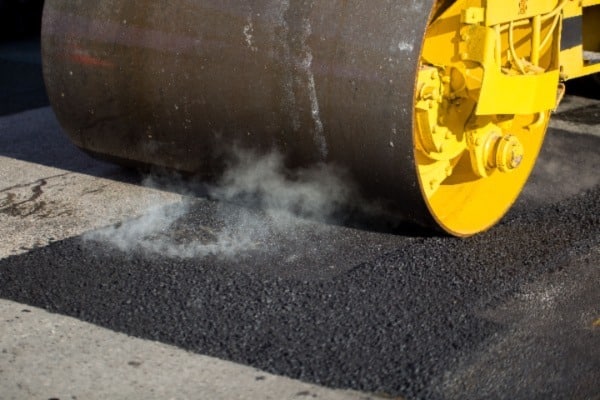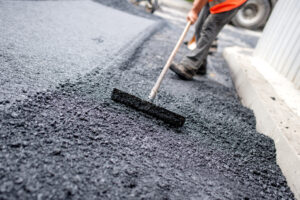Asphalt comes in various forms, each designed with a specific purpose in mind. Despite their differences, all different types of asphalt share a common objective: to deliver a durable and weather-resistant surface for roads, parking lots, and freeways. In the sections below, we will explore the different types of asphalt, detailing their compositions, advantages and disadvantages, and the ideal applications for each. Whether you’re planning a new pavement project or looking to maintain existing surfaces, understanding the different types of asphalt available will help you make informed decisions for long-lasting and reliable results.
The 7 Types of Asphalt to Know
1. Hot Mix Asphalt (HMA)
Hot asphalt, also known as hot mix asphalt (HMA), is the most used type of asphalt. It is made by heating a mixture of aggregate (crushed stone, gravel, and sand) and asphalt cement (a petroleum product) at a high temperature, usually around 300-350 degrees Fahrenheit. The mixture is then mixed and transported to the job site, where it is laid and compacted while still hot.
Pros and Cons of Hot Asphalt
Some of the advantages of HMA include:
- Durable and strong, popular for high-traffic areas, such as roads and highways
- Resistant to water and weathering, excellent for areas with heavy rainfall or snowfall
- Customizable for specific needs, such as increased skid resistance or improved drainage
Some disadvantages are:
- Specialized equipment and trained personnel required to handle and lay hot asphalt
- High temperatures can be dangerous, safety precautions are crucial
Hot asphalt is a versatile and durable option for many projects, but it requires careful handling and skilled professionals to ensure it is installed correctly.
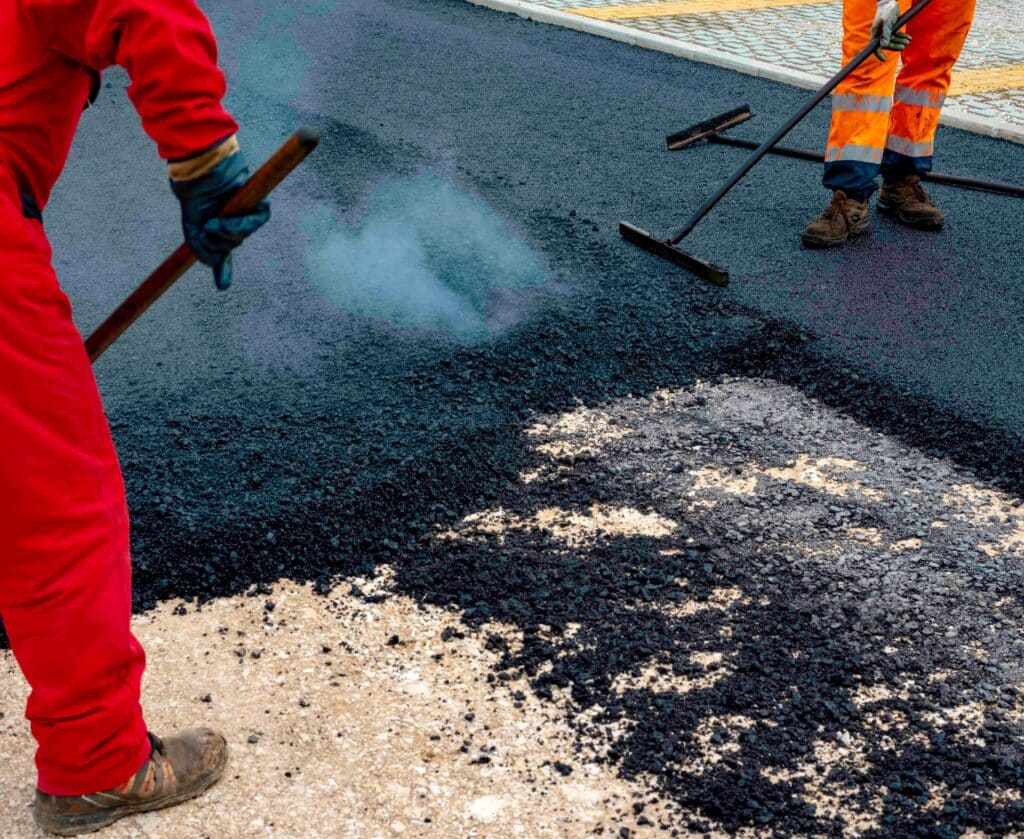
2. Warm Asphalt Mix (WMA)
Warm asphalt mix, also known as warm mix asphalt (WMA), is a relatively new type of asphalt that is gaining popularity in the construction industry. As its name suggests, it is made at a lower temperature than hot asphalt, typically between 200-250 degrees Fahrenheit.
Warm asphalt mix can be produced using various methods, including foaming, emulsion, and chemical sealer additives. And it can be used in the same applications as hot mix asphalt, such as roads, highways, and airports, but it can also be used for smaller, low-volume projects, such as driveways and parking lots.
Pros and Cons of Warm Asphalt Mix
Some of the advantages of WMA include:
- Lower production temperatures generate fewer emissions and pollutants, more environmentally friendly
- Reduces energy consumption and fuel costs with hot asphalt production
- More laying flexibility, can be transported over longer distances and laid in colder temperatures without less hardening risks
Some disadvantages are:
- Relatively new technology, long-term performance, and durability compared to hot asphalt are still being studied
- Higher costs than traditional hot mix asphalt
Warm asphalt mix is an innovative solution that offers many benefits, including reduced emissions and energy consumption, flexibility in the laying process, and the ability to be used in a wide range of projects. It’s an exciting option for many types of asphalt projects.
3. Cold Asphalt Mix (CMA)
MC Cold Mix, also known as Cold Mix Asphalt (CMA), is mixed and applied at lower temperatures than hot and warm asphalt. It is typically mixed at temperatures between 0-50 degrees Fahrenheit.
MC Cold Mix is typically made by combining aggregate, bitumen emulsion, and a small amount of water, creating a workable mixture that can be applied to the road’s surface. It is then compacted and left to cure, forming a durable, long-lasting surface.
Pros and Cons of Cold Asphalt Mix
Some of the advantages of CMA include:
- Can be used in a wide range of temperatures, ideal for extremely cold or hot weather areas
- Less specialized equipment and personnel required to handle and lay, cost-effective for small-scale projects
- Quick and easy repairs without waiting for favorable weather conditions
Some disadvantages are:
- Not as durable as hot and warm mix asphalt, unsuitable for high-traffic areas
- Shorter shelf-life than hot and warm mix asphalt, necessary to use it shortly after production
MC Cold Mix is a versatile and cost-effective solution for many projects, particularly in areas with extreme weather conditions and small-scale projects. It is a good option for temporary repairs and maintenance.
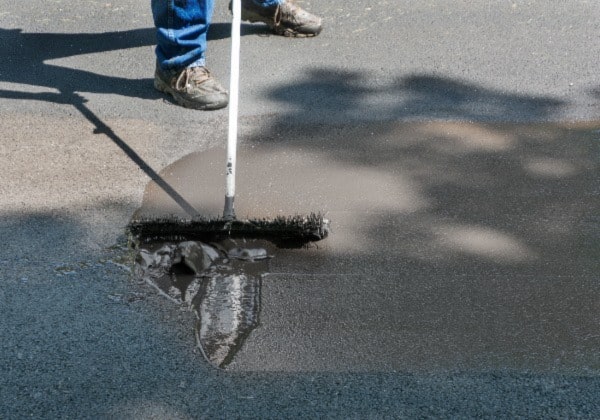
4. Ultra-Thin Pavement (UPM)
UPM, or Ultra-Thin Pavement, is a type of asphalt designed for very thin layers, typically between 1.5-3 inches thick. They’re also called “Fines”, which are used for repairing low spots (bird baths), so the edge will match the existing pavement better. This type of asphalt uses a high-performance binder and a specially designed aggregate blend to produce a durable, long-lasting surface.
UPM is often used where traditional asphalt is not an option, such as over existing asphalt or concrete surfaces or where the existing subgrade is unsuitable for conventional asphalt. UPM is also a good option for locations with weight restrictions, such as bridges or historic buildings.
Pros and Cons of Ultra-Thin Pavement
Some of the advantages of UPM include the following:
- Applicable in thin layers, reducing the number of materials required
- Minimizes the amount of excavation and disposal of existing materials compared to other mixes
- Sustainable option, made with recycled materials, and reduces the carbon footprint associated with traditional asphalt
- Versatile applications include roads, parking lots, bike lanes, and sidewalks.
- Can be colored and stamped to create an attractive and unique surface
Some disadvantages are:
- Not as durable as traditional hot mix asphalt
- Requires specialized equipment and trained personnel to handle and lay it
- Requires regular maintenance
- Unsuitable for heavy traffic areas
To summarize, UPM is versatile and sustainable, great for unique surfaces and reducing carbon footprint, can be used in various applications, and is ideal when traditional asphalt is not an option or when weight restrictions exist.
5. Milled Asphalt
Milled asphalt is produced by grinding up existing asphalt surfaces, such as roads or parking lots, to create a fine, recyclable material. The milled asphalt can then be transported to a plant and used as a base for new asphalt surfaces or as an addition to the hot mix.
Milled asphalt can also level out existing surfaces, filling in low spots and creating a smooth surface. This can extend the surface’s life and improve safety for vehicles and pedestrians.
Pros and Cons of Milled Asphalt
Some of the advantages of milled asphalt include the following:
- Sustainable and cost-effective solution for resurfacing existing asphalt surfaces
- Reduces materials required, associated costs, and environmental impact
- Can be used as a base for new asphalt surfaces, improving the overall strength and durability of the new surface
Some disadvantages are:
- Not as durable as new asphalt
- Requires specialized equipment and trained personnel to handle and lay
- Regular maintenance is required to ensure the surface remains smooth and safe
In short, milled asphalt is sustainable and cost-effective, suitable for resurfacing and extending the life of existing surfaces. It can be used as a base for new surfaces, improving overall strength and durability.
6. Porous Asphalt
Porous asphalt is a type of asphalt that is designed to allow water to pass through the surface, reducing the risk of flooding and erosion. It is made using a unique blend of aggregates and asphalt binder that creates small voids or pores in the surface, allowing water to filter through to the subgrade.
Pros and Cons of Porous Asphalt
Some of the advantages of porous asphalt include the following:
- Strengthens stormwater management, reducing the risk of flooding and erosion
- Improves water quality by removing pollutants and sediment from stormwater before it enters the drainage system
- Versatile applications include roads, parking lots, bike lanes, and sidewalks.
- Can be colored and stamped to create an attractive and unique surface
- Helps reduce the urban heat island effect by allowing more water to infiltrate the soil
- Reduces the need for traditional drainage systems, such as curbs and gutters, which can be costly and require much space
Some disadvantages are:
- Very costly, difficult to find companies able to do it
- Difficult to source the asphalt since most plants don’t manufacture it
- Not as durable as conventional hot mix asphalt
- Needs specialized equipment and trained personnel to handle and lay
- Requires regular maintenance to ensure the surface remains smooth and safe
Overall, porous asphalt is sustainable and innovative, good for stormwater management and water quality, highly versatile, can be colored and stamped for unique surfaces, helps reduce the “urban heat island” effect, and reduces the need for traditional drainage systems. It’s a fantastic environmentally-friendly option.
7. Dense-Graded Mixes
Dense-graded mixes, also known as dense-graded asphalt, is a type of asphalt that is characterized by its high density and uniformity of aggregate size. It combines a precise blend of coarse and fine aggregates and asphalt cement to create a durable and long-lasting surface.
Dense-graded mixes are often used for constructing roads, highways, airports, high-traffic areas, parking lots, driveways, and other low-volume projects. It also can be used as a base course for different types of asphalt surfaces.
Pros and Cons of Dense-Graded Mixes
Some of the advantages of dense-graded asphalt include:
- Provides a strong, durable surface to withstand heavy traffic and extreme weather conditions
- Easy to lay and maintain, a cost-effective option for many projects
- Customizable to meet specific needs, such as increased skid resistance or improved drainage
Some disadvantages are:
- Susceptible to rutting and deformation in areas with heavy traffic
- Requires specialized equipment and trained personnel to handle and lay
- Less flexible and can be more prone to cracking in extreme weather conditions
In summary, dense-graded mixes are strong, durable, easy to lay and maintain, and can be customized to meet specific needs. It is a cost-effective option for high-traffic areas and other projects requiring a strong, long-lasting surface.
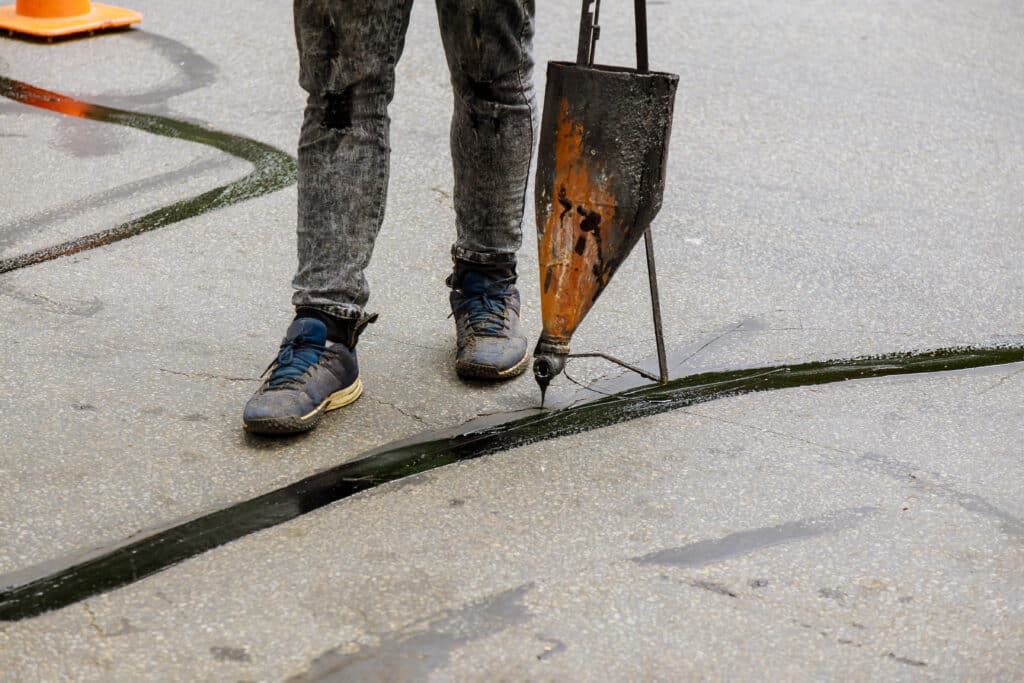
How to Choose the Right Asphalt
With so many different types of asphalt available, it can be overwhelming to determine the best fit for your project. The right kind of asphalt will depend on various factors, including location, climate, traffic volume, and budget.
When choosing the right asphalt for your project, it is crucial to consider the following factors.
Climate
Consider the weather conditions in the area where the asphalt will be laid. Hot mix asphalt is best for areas with mild weather conditions, while warm mix asphalt is better for areas with extreme heat or cold. Cold mix asphalt is a good option for areas with extremely cold temperatures.
Traffic Volume
Consider the amount of traffic the surface will be exposed to. Dense-graded mixes are best for high-traffic areas, while porous asphalt is better for low-volume areas.
Durability
Consider how long the surface will need to last. Hot and warm mix asphalt is the most durable option, while cold mix and UPM are better for short-term projects.
Sustainability
Consider the environmental impact of the project. Warm mix, UPM, and porous asphalt are more sustainable options than traditional hot mix.
Budget
Consider the cost of the project and the materials required. Some types of asphalt, such as UPM and warm mix, may be more expensive than traditional hot mix. Consultation with a professional contractor or engineer is always recommended to ensure that the best option is chosen for your specific project needs.
Keeping your driveway or parking lot in top condition is essential regardless of the type of asphalt you choose. Regular maintenance, such as sealcoating and crack filling, will help extend the life of your pavement and keep it looking its best.
Keep Your Asphalt in Top Shape with Superior Asphalt
If you have questions about types of asphalt or how to maintain your pavement, Superior Asphalt, LC professionals are here to help! We offer asphalt sealcoating services, asphalt repairs, crack sealing, and more that can help protect your pavement from weather damage and wear and tear.
Contact us today to learn more!
Related Articles:

